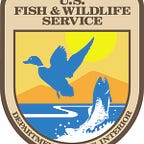Building Community, One Day at a Time in Oregon
By Brent Lawrence, public affairs officer with the U.S. Fish and Wildlife Service’s Columbia Pacific Northwest Region.
Tualatin River National Wildlife Refuge, located within the Portland, Oregon, metro area, recently held a special community work day for roughly 40 volunteers from the Oregon Chinese Coalition.
Appropriately masked and following COVID precautions, the Oregon Chinese Coalition members removed invasive plants, learned about wildlife conservation and developed a new relationship with our public lands. The community work day was part of the U.S. Fish and Wildlife Service’s (Service) efforts to reach a diverse, urban audience.
“We were honored to have the Oregon Chinese Coalition at the refuge,” said Eva Kristofik, acting project leader at Tualatin River National Wildlife Refuge Complex. “We’re always looking for ways to reach new audiences as a part of the Administration’s priority of advancing racial equity by providing wildlife related education and recreation opportunities to underserved communities. This is just the first step in developing a long-term relationship with the local Chinese community.”
The day was the culmination of effort by the Oregon Chinese Coalition, the Service’s Office of Law Enforcement, the refuge and the Friends of Tualatin River NWR. Once plans were in place, the Oregon Chinese Coalition notified members of the community service opportunity and the limited spots quickly filled up, with a number of people on the waiting list.
“When we formed five years ago, we had a wish to give back to the community,” said Zhunquin Wang, one of the directors with the Oregon Chinese Coalition. “We have been doing quite a few service projects, and this is just one of them. Of course, younger generations like to do service projects in nature. Our organization uses things like this to inspire the willingness to give back to the communities, and this wonderful refuge is part of our community.”
Paul Montuori, special agent with the Service’s Office of Law Enforcement, was the person who initially connected the Oregon Chinese Coalition with the refuge.
“One of our goals is to promote a greater understanding of different ways to support wildlife conservation and highlight how we can come together in support of our public lands,” Montuori said. “I’m glad we were able to connect the Oregon Chinese Coalition with the Friend’s group and refuge so they could put together this field day. My family and I enjoyed getting to know the Oregon Chinese Coalition members and working side-by-side with them to remove invasive species.”
The volunteers broke into small groups while at the refuge, rotating between three field opportunities. The Friends of the Refuge took one group on a tour to learn about wildlife, conservation and opportunities at the refuge, while the two other groups worked with refuge staff to remove invasive plants. One team cut out blackberry bushes around some trails, while the other team pulled velvetleaf and cocklebur from a dry wetland.
Wang said that many of the Oregon Chinese Coalition members are the first generation to live in the United States, which highlights the importance to introduce them to opportunities on public lands.
“Some of the (volunteers) might not have been here before and this is a wonderful opportunity to introduce them,” Wang said. “They might come back in the future. Most of the parents here are the first generation in the United States, and they come here to have families and this is their home. They want to help build a better hometown, and pass that along to their children. We got an overwhelming response for this service project. We had a long waiting list, so we may be able to do more service projects here based on that interest.”
It was such a success, the refuge and Oregon Chinese Coalition are now collaborating on a conservation-related art contest, as well as future community work days.
